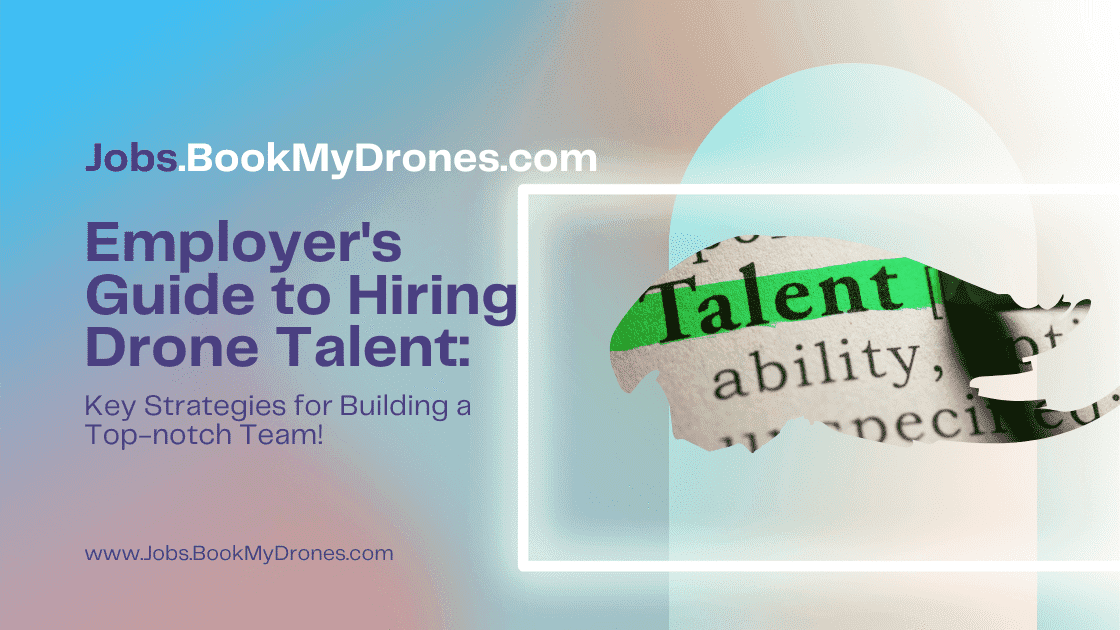Employer’s Guide to Hiring Drone Talent: Key Strategies for Building a Top-notch Team!
Drones have become integral across various industries, revolutionizing how businesses operate. As companies increasingly recognize the value of incorporating drone technology into their operations, the need for skilled drone talent has never been more critical.
I. Introduction
In the fast-evolving landscape of technology, drones have emerged as versatile tools with applications ranging from agriculture and construction to surveillance and delivery services. As businesses harness the power of drone technology, hiring a competent drone team becomes paramount for success.
II. Understanding the Role of Drone Talent
A. Different Expertise Areas in Drone Technology
1. Pilots
Drone pilots are the backbone of any drone team, responsible for navigating unmanned aerial vehicles safely. Their skills extend beyond flying; they must also interpret data and troubleshoot technical issues.
2. Engineers
Engineers play a crucial role in designing and maintaining drones. Their expertise ensures that the technology operates seamlessly and evolves with industry advancements.
3. Data Analysts
Interpreting data collected by drones is essential for deriving actionable insights. Data analysts in a drone team must possess the analytical skills to make sense of complex information.
B. Importance of Having a Diverse Drone Team
A diverse team brings different perspectives, problem-solving approaches, and creativity, enhancing the overall effectiveness of a drone team.
III. Key Strategies for Hiring Drone Talent
A. Identifying Specific Skill Sets Needed for the Job
1. Technical Skills
Ensure candidates possess the technical proficiency required for drone operation and maintenance, including familiarity with software and hardware.
2. Regulatory Knowledge
Understanding the regulatory landscape is crucial. Candidates should be well-versed in local and international drone regulations.
3. Problem-solving Abilities
Drone operations often involve unexpected challenges. Seek candidates with strong problem-solving skills to handle unforeseen issues effectively.
B. Utilizing Specialized Recruitment Platforms
Explore dedicated drone talent platforms to connect with professionals who have a proven track record in the industry.
C. Networking Within the Drone Community
Engage with industry events, forums, and social media groups to tap into the existing pool of drone talent and build connections.
IV. Evaluating Candidates Effectively
A. Creating Realistic Simulation Scenarios for Technical Evaluation
Simulate real-world scenarios to assess how candidates handle challenges, showcasing their practical skills.
B. Assessing Regulatory Knowledge and Compliance Understanding
Include assessments that evaluate a candidate’s understanding of regulations and their ability to ensure compliance.
C. Importance of Soft Skills in a Drone Team
Effective communication, teamwork, and adaptability are vital soft skills in a field where collaboration and quick decision-making are paramount.
V. Retention Strategies for Drone Talent
A. Offering Continuous Learning and Development Opportunities
Invest in the professional growth of your drone team by providing training programs and opportunities for skill enhancement.
B. Providing Competitive Compensation and Benefits
Recognize the unique skill set of drone professionals by offering competitive salaries and comprehensive benefits packages.
C. Fostering a Positive and Innovative Work Culture
Create an environment that encourages innovation and collaboration, contributing to job satisfaction and team cohesion.
VI. Overcoming Common Challenges
A. Addressing Regulatory Changes and Compliance Issues
Stay abreast of regulatory changes and proactively adapt your team’s practices to remain compliant.
B. Navigating Public Perception and Privacy Concerns
Educate your team on the importance of addressing public concerns about drone technology and privacy, fostering responsible use.
C. Managing Team Dynamics and Collaboration Challenges
Implement effective communication channels and team-building activities to enhance collaboration and mitigate conflicts.
VII. Case Studies: Successful Drone Talent Teams
A. Highlighting Businesses with Exemplary Drone Teams
Explore case studies of companies that have built successful drone teams, learning from their strategies and best practices.
B. Lessons Learned from Their Hiring and Management Practices
Extract valuable insights from the experiences of successful businesses, applying lessons to your own drone talent acquisition and management.
VIII. Future Trends in Drone Technology and Talent
A. Anticipating Advancements in Drone Capabilities
Stay ahead of industry trends and advancements, preparing your team for the next wave of technological innovation.
B. Preparing for Emerging Skill Requirements in the Industry
Adapt to the evolving needs of the drone industry by identifying and preparing for new skill requirements.
IX. Conclusion
In conclusion, building a top-notch drone team involves a strategic approach to hiring, evaluating, and retaining talent. As the drone industry continues to advance, adaptability and a proactive mindset will be key to staying competitive.


Comments are closed